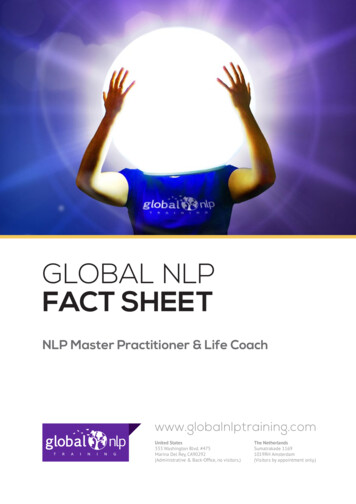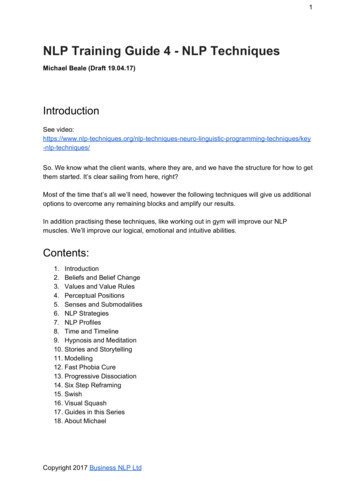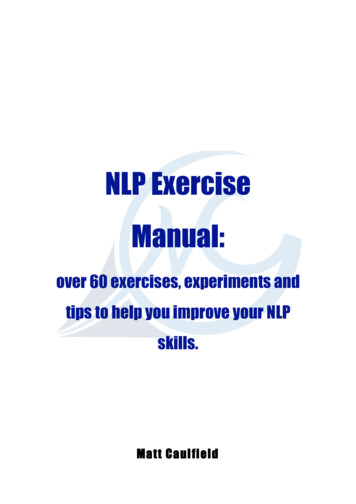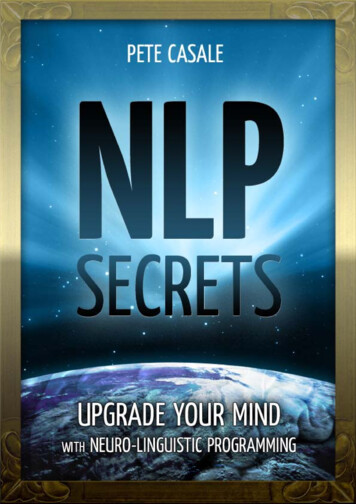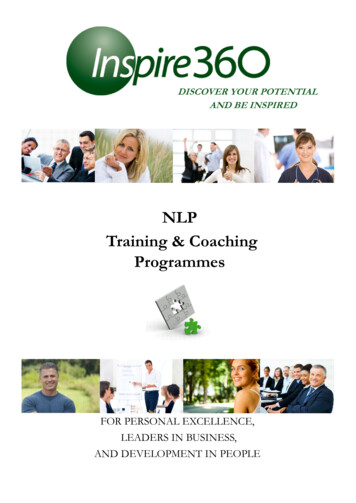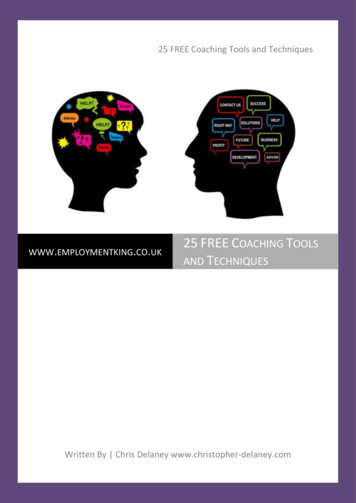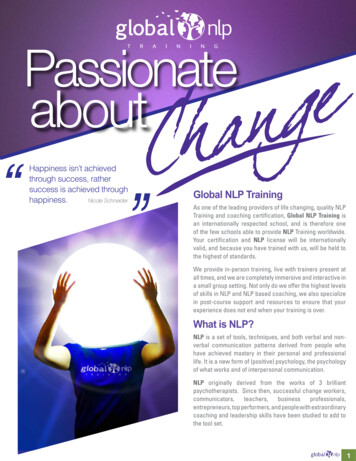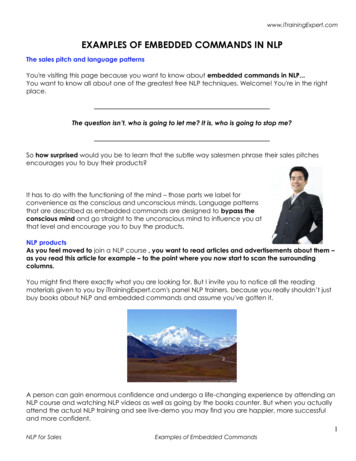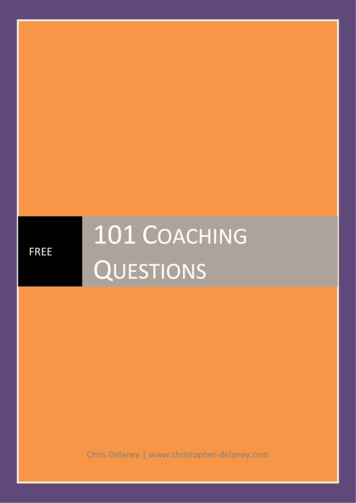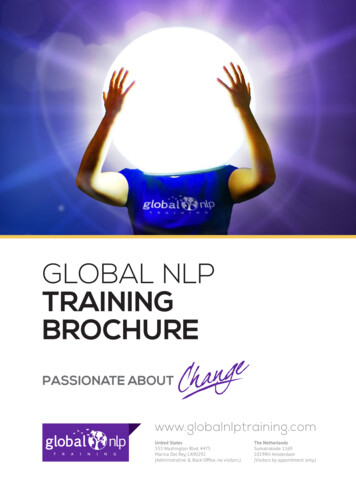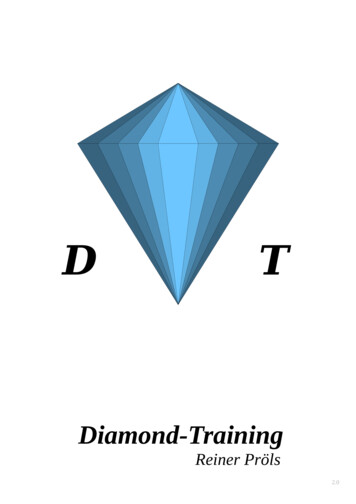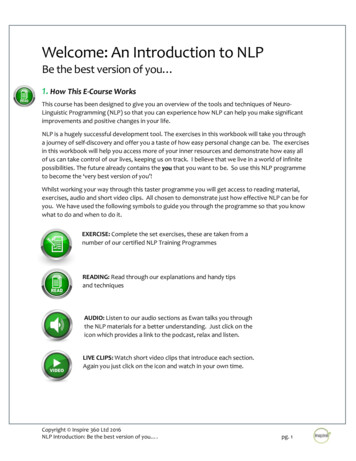
Transcription
Welcome: An Introduction to NLPBe the best version of you 1. How This E-Course WorksThis course has been designed to give you an overview of the tools and techniques of NeuroLinguistic Programming (NLP) so that you can experience how NLP can help you make significantimprovements and positive changes in your life.NLP is a hugely successful development tool. The exercises in this workbook will take you througha journey of self-discovery and offer you a taste of how easy personal change can be. The exercisesin this workbook will help you access more of your inner resources and demonstrate how easy allof us can take control of our lives, keeping us on track. I believe that we live in a world of infinitepossibilities. The future already contains the you that you want to be. So use this NLP programmeto become the ‘very best version of you’!Whilst working your way through this taster programme you will get access to reading material,exercises, audio and short video clips. All chosen to demonstrate just how effective NLP can be foryou. We have used the following symbols to guide you through the programme so that you knowwhat to do and when to do it.EXERCISE: Complete the set exercises, these are taken from anumber of our certified NLP Training ProgrammesREADING: Read through our explanations and handy tipsand techniquesAUDIO: Listen to our audio sections as Ewan talks you throughthe NLP materials for a better understanding. Just click on theicon which provides a link to the podcast, relax and listen.LIVE CLIPS: Watch short video clips that introduce each section.Again you just click on the icon and watch in your own time.Copyright Inspire 360 Ltd 2016NLP Introduction: Be the best version of you .pg. 1
2. Who are Inspire 360?Here at Inspire 360 we have one of the best ABNLP MasterTrainers in the world. Ewan Mochrie has been training NLP forover a decade, certifying NLP Practitioners, MasterPractitioners, NLP Coaches and NLP Trainers. He has deliveredtraining to some of the UK’s largest organisations whichinclude NHS, MOD, Nissan and Marks & Spencer. Ewan is oneof only a handful of ABNLP Master Trainers in the world and isrecognised by many of the UK’s NLP independent membershiporganisations.Ewan MochrieMaster Trainer of NLP & HypnosisTrainer of Coaching & Time LineTherapy Inspire 360 was founded back in 2005 by Ewan Mochrie andJoanne Binks. Having worked together in a previousorganisation, they recognised that there was a real need foreffective personal development tools and improved coachingprocesses. Their goal was to help others to see a much biggerworld and the opportunities within it; enabling people tobecome more confident and to explore different areas withintheir lives; training them to use the skills not only forthemselves but also to spread the word about positive changeusing NLP to improve the lives of others too.3. What can NLP do for you?One way of thinking about NLP is that it is an instruction manual for your mind; it is aboutempowering you with tools that teach you how to think, rather than what to think. What thatmeans is that it can help you be more of who you want to be in all areas of your life. A fundamentalchange of mind set to appreciate at this stage is that there is no such thing as a “work lifebalance”, there is just life; this one precious life that you are leading right now. NLP can help you inany area of your life, be that career, family, relationships, personal growth, health & fitness or evenspirituality. NLP puts you back in charge of your life; it provides sensible ways of thinking aboutyour experience and it provides change techniques that allow you to remove the blockages thatprevent you from being, doing and having what you want in your life.With NLP you can take the next step on the career ladder or you can change career altogether, youcan lose weight, you can have the sort of relationship that you want, you can enhance the harmonyin your family, you can let go of past patterns and habits, creating the future you want anddiscovering more about who you are in the process. So if NLP is so great why isn’t everyone usingit? The simple answer is that everybody should be using it! Sometimes people want to change anddon’t know how, and sometimes people don’t make change the priority, right now. Sometimespeople feel that living in the known “not bad” is better than the unknown “what could be”. Simplygetting this far you are saying to yourself that now is the time for you to do what you want to do.So make that commitment to yourself now. This NLP introductory programme is here to supportyou to be the best version of you; others have taken these steps before you; we know you can doit too.Copyright Inspire 360 Ltd 2016NLP Introduction: Be the best version of you .pg. 2
Part One: Understanding NLP4. What is NLP?Neuro-Linguistic programming (NLP) is an attitude of the mind. A set of tools and techniques forgetting better results in your life, your work and your relationships. It demonstrates how yourmind really works, how it filters and interprets information, how you make decisions and how youinteract with the outside world. The best way to utilise it, is to fully integrate it into who you areand what you do.One of the creators defined NLP as:“An attitude and methodology that leaves a trail of techniques”An Attitude-Wanton CuriosityA want to ExperimentA Methodology-Modelling OthersDe-nominalisation (understanding the processes)Continual ExperimentationA Trail of Techniques-The Procedures and Systems which are taught as NLPIt represents an attitude of curiosity and of wanting to know what is going on behind every event,behaviour and action. It is a willingness to experiment and experience new things and new ways ofbeing.The methodology used throughout is modelling. Modelling is a way of replicating excellence.Often called a Psychology of Excellence, modelling is about discovering and taking on the beliefs,values, behaviours and mental sequencing found in people who are excellent in what they do sothat you are able to utilise these ways of being for yourself and then to teach others.Copyright Inspire 360 Ltd 2016NLP Introduction: Be the best version of you .pg. 3
5. The Definition of NLPNeuro-Linguistic Programming is the study of the structure of subjective experience. The nameNeuro-Linguistic Programming comes from:Neuro: The study of the mind and nervous system (how we think), through which ourexperience is processed, how we re-present the outside world to ourselves via our five senses: stic: The study of language and how we use it. Language and other non-verbalcommunication systems through which our neural representations are coded, ordered and givenmeaning. Includes: PicturesSoundsFeelingsTastesSmellsWords (Self Talk)Programming: The sequence of our actions; how we motivate ourselves to achieve ourgoals. The ability to discover and utilise the programs that we run (our communication toourselves and others) in our neurological systems to achieve our specific and desired outcomes.In other words, NLP is how to use the language of the mind to consistently achieve our specific anddesired outcomes.Copyright Inspire 360 Ltd 2016NLP Introduction: Be the best version of you .pg. 4
6. Conscious / UnconsciousEverybody has a conscious and unconscious mind (or ‘sub-conscious’ or ‘other-than-conscious’mind)It is within the conscious mind that we set directions and goals, and our unconscious mind helps usget there.According to Milton Erickson (MD), people came to see him because they were out of rapportwith their unconscious mind – they just didn’t know it.People function better when there is co-operation between the conscious and unconscious mind.ALL LEARNINGS BEHAVIOURS CHANGES .ARE UNCONSCIOUSCopyright Inspire 360 Ltd 2016NLP Introduction: Be the best version of you .pg. 5
7. The NLP Communication ModelOriginally conceived and developed by Richard Bandler and John Grinder, NLP or Neuro LinguisticProgramming began life as a model, which illustrates how we communicate and relate to ourselvesand others. The NLP Communication Model explains how we process the information that comesin from external events and demonstrates the processing steps we use internally, which thendetermines our state, physiology and external behaviours.In NLP, we believe that “The map is not the territory,” so the internal representation that we makeabout an external event is not essentially the event itself. What we actually do is run that eventthrough our internal processing system. From here we make an Internal Representation (I/R) ofthat event. The I/R of the event then influences our physiology and our state. ‘State’ refers to theinternal emotion that the individual senses e.g. happy, sad, motivated etc.People can perceive the same events differently. Some people have to ‘see’ certain relationshipsbetween things (V-Visualise), some will need to ‘hear it’ (A-Auditory), others have to ‘get a grasp ora feeling’ (K-Kinaesthetic) for the relationships, whilst others have to have it explained and fullyunderstand (AD-Auditory Digital). This is the essence of the NLP Communication Model now let’swatch the process in action***WHAT YOU FOCUS ON DETERMINES YOUR RESULTS***Copyright Inspire 360 Ltd 2016NLP Introduction: Be the best version of you .pg. 6
Our FiltersDeletionWithout deletion we would be faced with far too much information for our conscious mind to handle.Deletion occurs when we selectively pay attention to particular aspects of our experiences and notothers.DistortionDistortion happens when we make shifts of data in our sensory data, by making misrepresentationsof what is real. For example, this can happen when we mistake somebody for someone else or even‘imagining’ how the interior of a room would look before you decide to decorate.GeneralisationThis is where we draw like conclusions about someone or something based upon one or twoexperiences. To generalise helps us to learn and teach by taking the information we have anddrawing conclusions about the meaning of the effect of those conclusions. Although, generalising atits worst can allow us to form disempowering beliefs about ourselves and our capabilities which canhold you back for the rest of your life.ValuesOur Values are an evaluation filter; they are how we decide what is good or bad, right or wrong. Theyhelp us decide about how we feel about our actions. Values are aspects of life that are important tous. They are essentially a deep, unconscious belief system about what’s important to us. They canchange with context and can be very closely related to how we are influenced from a very early age.You will have values about what you want from a relationship or what you want from your career.They are arranged in a hierarchy with the most important one typically being at the top and lesserones below that.BeliefsBeliefs are assumptions we have about the way the world is, and can either empower or bedisempowering for us. If you are working with somebody’s beliefs, it is important to elicit or find outwhat beliefs they have to cause them to do what they do. You also need to discover whatdisempowering beliefs they hold which do not allow them to do what they want to do.LanguageLanguage describes experiences (words are labels), they are not the experience itself. People’slanguage will influence their view of the world, for example bi-lingual people frequently say that theyfeel and/or behave differently depending on the language they are speaking. Even for two nativespeakers the same word may mean a slightly different meaning for different people.Copyright Inspire 360 Ltd 2016NLP Introduction: Be the best version of you .pg. 7
8. Empowering Beliefs1. I am Responsible for my Life (Cause & Effect)To have maximum power over all situations you encounter in life, you need to take responsibilityfor everything that happens in your universe.GETSRESULTSGIVES REASONS EXCUSES JUSTIFICATIONSWhich side of the CAUSE & EFFECT equation do you sit on? Are you the cause of your life, or areyou the effect of what happens in your life?To be empowered and change your behaviour you must sit on the CAUSE side of life.Take RESPONSIBILITY for your life.2. People are not their behaviours. (Accept the person; change the behaviour.)3. There are no un-resourceful people, only un-resourceful states.4. There is ONLY feedback! (There is no failure, only feedback.)5. The meaning of your communication is the response your getExercise: What Changes for You?Review the 5 beliefs above and ask yourself ‘How can I now apply these in 3 or more situations inmy life, so that I am able to change my behaviour?’Copyright Inspire 360 Ltd 2016NLP Introduction: Be the best version of you .pg. 8
Part Two: Coaching Your Personal GrowthNow that you have an understanding of what NLP (Neuro Linguistic Programming) is and where itoriginated. What we are going to do in Part 2 is to use some NLP tools to help you get more focus inyour life. By reading the content, listening to audio and completing the exercises in this section it willprovide you with all you need to create, write and measure a great long term goal and structure someshorter term milestones. There are many more areas within the NLP Practitioner training that cansupport these processes too, so make sure you take up our superb offer at the end of this onlinetraining.Part Two Overview: Outcomes & EcologyYour Long Term GoalWheel of LifeValues & ElicitationSMART Outcomes ReframingResponsibilityResourcesGoals & Milestones9. Outcome & EcologyOne of the key differences that made famous therapists Satir and Erickson excellent was that theywere Outcome Oriented in their work with clients.If you set an outcome you instantly become aware of where you are now and what you may needto do to get that end result. If you filter your thinking towards what you want to achieve, you willp
Practitioners, NLP Coaches and NLP Trainers. He has delivered training to some of the UK’s largest organisations which include NHS, MOD, Nissan and Marks & Spencer. Ewan is one of only a handful of ABNLP Master Trainers in the world and is recognised by many of the UK’s NLP independent membership organisations. Inspire 360 was founded back in 2005 by Ewan Mochrie and Joanne
